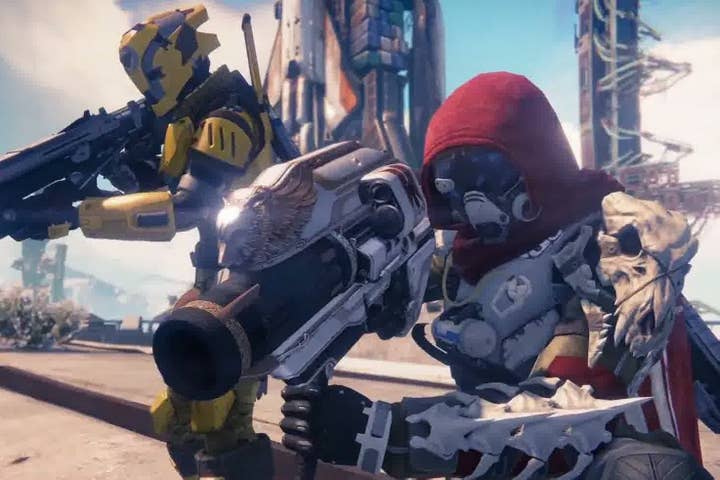Where Destiny Leads
Bungie's latest is a huge hit, but it's hard to see how it can sustain a long tail - regular DLC packs will hit diminishing returns very quickly
By almost any measure you care to apply, Bungie's Destiny is a phenomenally successful game. It had one of the strongest launches of any game in history, sold many millions of units and many hundreds of thousands of new-gen consoles and, despite a mixed critical reaction, has inspired immense devotion from a huge audience of fans, with millions logging in each day to play the game. Criticisms of Destiny do abound, and many are very reasonable; the game is particularly weak as an MMO, with a paper-thin world and forgettable characters, not to mention a paucity of content at the high end which has led to deep disappointment for some players who expected something more like the holy grail of a marriage between the best aspects of World of Warcraft and the best aspects of Halo. That's not what we got in the end; but what we did get is hugely compelling and entertaining, at least for many millions of players, myself included.
There's just one problem. Destiny isn't just a standalone game, like Halo was; this is a game which is designed from the outset to have a long tail, many months if not years of continuing evolution in its world and continuing progress for players' characters. In that much, it is structured like an MMO, yet its business model is very different to WoW; there is no monthly subscription to keep the servers switched on and the content teams at work. Activision and Bungie need a different revenue stream to keep Destiny going; for that, they have turned to DLC.
The first DLC pack for Destiny will appear in December, costing $19.99 (or, in a fairly blatant bit of gouging, £19.99 for UK customers; over three times the price hike which would be justified by the UK's sales taxes). Another is planned for early in the new year, with the same price tag. It's unclear what's planned after that, but it seems likely that Bungie will continue to make these DLC expansions until the law of diminishing returns renders them untenable, or the studio has to ramp up on its next full-release title (Destiny 2, or whatever it may be).
"Subscriptions generally get paid automatically every month and the player has to make a decision to terminate them; Destiny's DLC, by contrast, requires the player to make a decision every two months or so to stay on the treadmill"
In a very basic sense, this pricing isn't dissimilar to other MMOs. My most recent MMO addiction was Final Fantasy XIV: A Realm Reborn, which costs about $10 a month to play; roughly every two months, the team releases a new content update for the game which generally adds some new dungeons to play through, a few new quest chains to complete and so on. In theory, one could simply say "you're no longer paying $10 a month for access to the game, instead you're paying $20 every two months for the content patches", and nothing ought to change; the same money for the same service.
I suspect that some logic of that description has been applied in pricing discussions at Activision and Bungie. Destiny may fail (somewhat miserably) as an MMO title right now, but it's been designed from the outset as something along those lines. That's not a surprise; Activision's experience with the vast cash-generating prowess of World of Warcraft, along with its annual Call of Duty cash cows, has meant that an FPS game that can deliver WoW-like subscription revenue has been the dream for the publisher for a long time. Attempts to turn Call of Duty into a subscription service collapsed, so Destiny is the next real attempt to make this work; albeit with a business model that looks superficially different.
In truth, though, this is more than a superficial difference. $20 every two months for DLC may look the same in an accountant's spreadsheet to $10 every month for a subscription, but the difference to a customer is immense. Candidly, if Square Enix turned around to me every two months and said "here's what's in the next FFXIV patch, will you pay $20 for it?", I'd probably say no. The patches are great, with lots of interesting new stuff to do, but forced to consider whether they were worth $20, I would look around at all the other things I could buy for $20 and quickly decide it was better spent elsewhere. By contrast, with the subscription model, I feel like I'm paying for access to the game, and when the patches arrive loaded with content, I actually feel good about the game because there's a sense (as illogical as it may be!) that the developers have just given us more "free" content.
Contrast that with the backlash Activision and Bungie have received this week in the wake of revealing details of the first Destiny DLC. Xbox One players, who will only be able to play one of the two new Strike dungeons but will have to pay the same amount of money for the DLC, are feeling particularly hard done by, but even PS4 players are finding the value proposition hard to stomach. The new DLC will add one or two more Strikes (short three-man dungeons), a new Raid (a lengthy six-man dungeon, although the requirement for a six-man team of your friends to enter these dungeons means they're effectively locked away from many more casual players) and some more missions and equipment; it's not a bad amount of content, but it's very hard to come up with any acceptable bill of goods with that content above the line and "twenty bucks" written underneath the line.
Moreover, since this is DLC and not a subscription, players are going to have to make this decision every single time a new DLC pack comes out. Subscriptions generally get paid automatically every month and the player has to make a decision to terminate them; Destiny's DLC, by contrast, requires the player to make a decision every two months or so to stay on the treadmill. "Yes, I still play and love this game enough to fork out again"; there's a certain honesty to asking your players that question every couple of months, but it's fairly clear that it will result in a very rapid drop-off in returns from each subsequent DLC pack.
"If Destiny is to have a long enough tail to truly be a new 'pillar' for Activision's business, it may need some serious surgery on its business plan"
I do understand how Activision ended up in this situation. Launching a game with a subscription model is a risky proposition; it can put people off trying out the game in the first place, for one thing. Destiny would never have achieved those opening weekend sales if people were expected to pay a subscription fee. It would also have created very different expectations of the game, whose MMO components, end-game content and storytelling would need to be vastly, vastly more compelling in order to justify a monthly fee. Arguably the only way to really push Destiny as a subscription business would have been to change the game significantly (not the excellent shooting, but the weak metagame) and launch it as a free or damn-near free game, achieving huge initial uptake and hoping to convert as much of those early players as possible into subscribers. It would have been risky.
It might have been a risk worth taking. Keen to avoid that, Activision looked at other business models. Free-to-play was probably the wrong fit for this kind of game (you could make it work, and I wonder if the preponderance of cosmetic items serving no gameplay purpose suggests that F2P was considered at some point in development, but the game's audience is pretty much as core-gamer as it gets and F2P would have been an extraordinary risk). Thus, the DLC model was arrived at; but I can't help the feeling that in avoiding the risk of other models, Activision has chosen the worst of all worlds, a business model that practically demands overpriced content packs and guarantees a rapid drop-off in DLC sales due to the doomed strategy of demanding that customers make a proactive choice to pay every few months.
I could be mistaken; perhaps Activision and Bungie never planned to have more than a handful of content updates for Destiny, and won't be unhappy at all if customer numbers drop off rapidly with each subsequent DLC pack; perhaps there was never any intention to keep releasing DLC packs after the middle of next year, with the intention of ramping up on Destiny 2 at that point instead. I hope that isn't the case, though, because that would feel very much like a fatal error for the burgeoning franchise. Many players are currently very forgiving of the flaws in Destiny's weak MMO content, its metagame and its poorly fleshed out storytelling and world-building, simply because they are used to the idea that MMOs are flawed at launch and gradually build themselves into something much more in-depth and interesting.
If it transpires that Activision's actual plan for Destiny is to launch a handful of new dungeons and missions, filling in few if any of these gaps, and then move on to a brand new game in the franchise, it's going to do something no new franchise can afford to do; it's going to deeply disappoint and anger the people who are presently its most enthusiastic evangelists. Yet looking at the business model, I'm not sure I can see this panning out any differently, even if Activision and Bungie presently harbour a more optimistic plan. If Destiny is to have a long enough tail to truly be a new "pillar" for Activision's business, it may need some serious surgery on its business plan.









